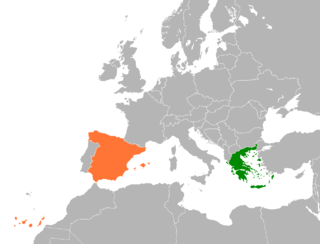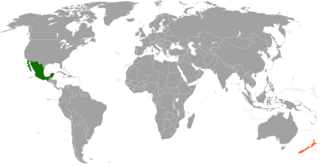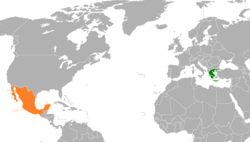
Both Greece and Spain are members of the European Union, NATO, the Organization for Security and Co-operation in Europe, the OECD, the Union for the Mediterranean, and the United Nations.

The nations Mexico and Russia initially established diplomatic relations in 1890. In 1924, Mexico recognized and established diplomatic relations with the Soviet Union. In 1930, Mexico broke diplomatic relations with the USSR and granted asylum to Leon Trotsky. In 1943, Mexico and the USSR re-established diplomatic relations. After the dissolution of the union, Mexico once again established diplomatic relations with the current Russian Federation in 1992.

Chile-Greece relations are the bilateral relations between Chile and Greece. Both nations are members of the United Nations.

The nations of Mexico and Turkey established diplomatic relations in 1928. Both nations are members of the G20, OECD and the United Nations.

Diplomatic relations between the Argentine Republic and Hungary have existed for decades. Argentina is host to one of the largest Hungarian communities outside of Hungary. There are approximately 30,000 to 40,000 Argentines of Hungarian descent. Both nations are members of the United Nations.

The nations of Finland and Mexico established diplomatic relations in 1936. Both nations are members of the Organisation for Economic Co-operation and Development and the United Nations.

The nations of Ireland and Mexico established diplomatic relations in 1974. The relationship has been often associated with the Irish migration to Mexico. Both nations are members of the Organisation for Economic Co-operation and Development, United Nations and the World Trade Organization.

The nations of Mexico and South Africa established diplomatic relations in 1993. Bilateral relations between both nations have been characterized by a good level of political dialogue and by the mutual recognition of the leadership and involvement exercised by both countries in their respective regions.

The nations of Iran and Mexico established diplomatic relations in 1964. Both nations are members of the Group of 15, Group of 24, and the United Nations.

Diplomatic relations between the Argentine Republic and the Republic of the Philippines, have existed for decades. Both nations are members of the Association of Academies of the Spanish Language, Group of 77, the G20 developing nations, and Forum of East Asia-Latin America Cooperation and the United Nations.

The nations of Mexico and New Zealand established diplomatic relations in 1973. Both nations are members of the Asia-Pacific Economic Cooperation, Comprehensive and Progressive Agreement for Trans-Pacific Partnership, Organisation for Economic Co-operation and Development, United Nations and the World Trade Organization.

The nations of Egypt and Mexico established diplomatic relations in 1958, however, the two states interacted non-officially before then. As early as 1861 Egyptian soldiers joined French Emperor Napoleon III invasion of Mexico. In the early 20th century, Mexico opened a consulate on the Mediterranean port city of Alexandria. Since Egypt's independence in 1960, both nations have maintained a warm relationship based on cultural exchanges, tourism and trade.

The nations of Mexico and Morocco established diplomatic relations in 1962. Both nations are members of the Group of 24 and the United Nations.

The nations of Mexico and Norway established diplomatic relations in 1906. Both nations are members of the Organisation for Economic Co-operation and Development and the United Nations.

The nations of Mexico and the Netherlands established diplomatic relations in 1827. Both nations are members of the Organisation for Economic Co-operation and Development and the United Nations.

The nations of Algeria and Mexico established diplomatic relations in 1964. Both nations are members of the Group of 15, Group of 24 and the United Nations.

The nations of Mexico and Switzerland established diplomatic relations in 1945, however, both nations had established official contact in 1827. Both nations are members of the Organisation for Economic Co-operation and Development and the United Nations.

The nations of Armenia and Mexico established diplomatic relations in 1992. Both nations are members of the United Nations and the World Trade Organization.

The nations of Lithuania and Mexico initially established diplomatic relations in 1938, however, diplomatic relations were interrupted with Lithuania's annexation by the Soviet Union. In 1991, both nations re-established diplomatic relations.

The nations of Cyprus and Mexico established diplomatic relations in 1974. Both nations are members of the United Nations.

























